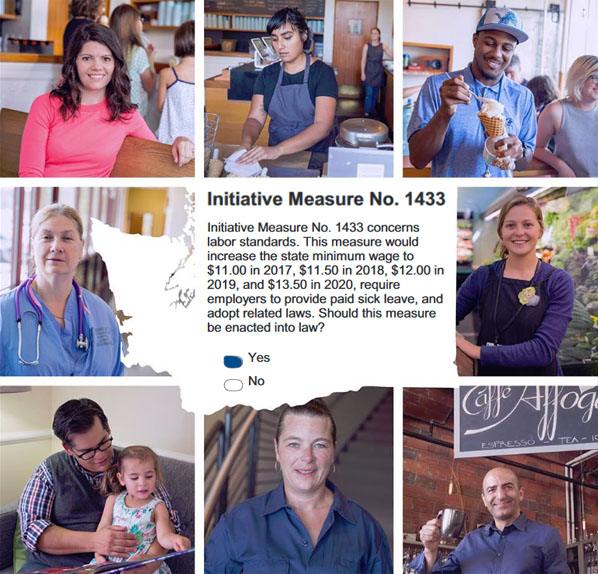STATE GOVERNMENT
New year brings paid family leave, minimum wage increase
OLYMPIA (Dec. 30, 2019) — When the new year — and decade — begins this Wednesday, don’t forget to celebrate the improvements in workplace standards and benefits that will arrive for Washington workers in 2020. All of these were the result of legislation, voter initiatives and policy changes supported by the Washington State Labor Council, AFL-CIO, alongside its affiliated unions and community partners.

PAID FAMILY LEAVE — Washington’s Paid Family and Medical Leave program starts Jan. 2, 2020. It guarantees workers three types of paid leave:
► MEDICAL LEAVE when a serious health condition prevents you from working. This covers a wide range of serious health needs. For example, you can qualify because of a major surgery, after giving birth to a baby, for bed rest during pregnancy, to receive treatment for a chronic health condition, and to receive inpatient treatment for substance abuse or mental health.
► FAMILY LEAVE when you need to take time off to care for a family member. If your family member has a serious health condition that would qualify them for medical leave, or if you’re welcoming a new baby or child into your family, that’s when you can take family leave. All new parents can apply for up to 12 weeks of leave to bond with a newborn, adopted or foster child younger than 18 years old.
► MILITARY LEAVE allows you to spend time with a family member in the military. If your family member is about to be deployed overseas or is returning from overseas deployment, that’s when you can take this type of family leave.
For more details on who qualifies, how much partial pay you can expect to receive, and how much leave you can take, visit this website.
 STATE MINIMUM WAGE — The Washington state minimum wage rises to $13.50 an hour on Jan. 1, 2020. This is the final step increase from Initiative 1433, approved by Washington voters in 2016, which raised the lowest legal wage to $11 in 2017, $11.50 in 2018, and $12 in 2019. Beginning in 2021, and each year thereafter, the state Department of Labor and Industries (L&I) will make a cost-of-living adjustment to the state minimum wage based on the CPI-W. Higher minimum wage rates will apply to workers in Seattle and the City of SeaTac (follow those links to determine the rates.)
STATE MINIMUM WAGE — The Washington state minimum wage rises to $13.50 an hour on Jan. 1, 2020. This is the final step increase from Initiative 1433, approved by Washington voters in 2016, which raised the lowest legal wage to $11 in 2017, $11.50 in 2018, and $12 in 2019. Beginning in 2021, and each year thereafter, the state Department of Labor and Industries (L&I) will make a cost-of-living adjustment to the state minimum wage based on the CPI-W. Higher minimum wage rates will apply to workers in Seattle and the City of SeaTac (follow those links to determine the rates.)
Also as a result of I-1433’s passage, employers in Washington state have been required to provide paid sick leave to their employees since 2018. Get details at L&I’s website.
OVERTIME PAY — In 2020, the state will begin phasing in its new overtime pay rules that will expand access to time-and-a-half pay to thousands of Washington workers.
Under current state rules, which haven’t been updated for more than 40 years, salaried workers who make more than $23,660 per year can be denied overtime pay and forced to work more than 40 hours per week for free. Over the next eight years, that overtime salary threshold will gradually increase until it reaches 2.5 times the Washington state minimum wage, or about $83,000 a year in 2028.
On Jan. 1, 2020, the federal overtime threshold will rise to $35,568, or $684 a week, qualifying an estimated 1.3 million more Americans for time-and-a-half unless their employers raise their salaries above that limit. That is millions fewer than would have benefited from a higher level proposed by the Obama administration.
Washington state’s “strongest in the nation” overtime threshold will begin to phase in on July 1, 2020, with an increase to 1.25 times the state minimum wage, roughly matching the federal increase from Jan. 1. But beginning on Jan. 1, 2021, it will surpass the federal threshold and continue to increase each year until reaching 2.5 times the state minimum wage. Learn more here.
What to do if you are denied the proper minimum wage or other worker rights
 L&I enforces the state’s wage-and-hour laws. If you believe your workplace rights have been denied by such things as not receiving at least the minimum wage or proper pay for hours worked, being denied rest or meal breaks, or not being allowed to use paid sick leave to care for a family member, you can file a complaint online. L&I investigates all wage-payment complaints.
L&I enforces the state’s wage-and-hour laws. If you believe your workplace rights have been denied by such things as not receiving at least the minimum wage or proper pay for hours worked, being denied rest or meal breaks, or not being allowed to use paid sick leave to care for a family member, you can file a complaint online. L&I investigates all wage-payment complaints.
L&I provides materials to help employers inform workers about the minimum wage and their rights as workers. Employers are required to post L&I’s “Your Rights as a Worker” poster in the workplace. The poster has general information about employment issues. An optional, minimum-wage poster is also available for employers. Both are free from L&I.
More information on Washington’s minimum wage is available on L&I’s Workers’ Rights webpage. You can also call 360-902-5800.





